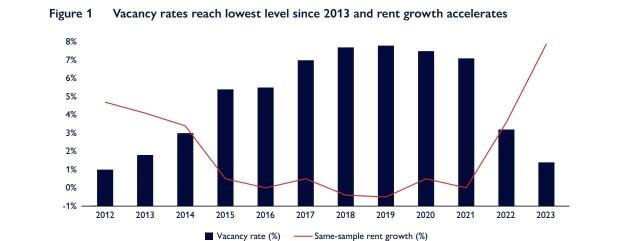As more immigrants make Sask. home, housing market falls behind while rents soar

Shafqat Nabi and Aisha Jamal say that in their short time in the city, they have found Saskatoon to be a very welcoming place — but not its rental market.
The couple and their twin daughters moved to Saskatoon from Qatar last month. They also visited the city last summer, and they say rents have really jumped since then.
"I definitely feel there is a jump of almost 20 per cent in terms of rent, and there are a lesser number of houses available at this point of time," Nabi said.
According to a recent report from Rentals.ca, "Saskatchewan overtook Alberta to become the provincial leader in annual rent growth in April," posting an 18.4 per cent increase. The report said the average rent in Saskatchewan is about $1,300. The national average asking price is almost $2,300.
Nabi and Jamal said that after a lot of research, they found a rental unit that meets their needs on the west side of the city for $1,850.
"But when it comes to the price, yes, we have to stretch our budget, which is very important for us because we have just landed. We don't have jobs and we have to set up the whole house," Jamal said.
WATCH | Newcomers say spike in Saskatoon rent costs a surprise:
Population growth drives demand
Saskatoon and Regina were two of the three census metropolitan areas in Canada that saw the largest increases in the annual number of immigrants arriving between July 1, 2022, and July 1, 2023, according to a recent Statistics Canada report.
During that time period, the population of the Saskatoon area increased by 16,161 and Regina by 10,585.
Population change in Census Metropolitan Areas in Saskatchewan
Nabi said that as the couple tracked the rents in Saskatoon before they arrived, they found many websites where rental listings had bidding quotes. He said to even arrange the showing of a listing, they had to bid the quoted price or higher.
"It's like whoever can bid the highest, it becomes an open market. That means any property developer can demand anything," the 49-year-old said.
"Rent control has to be there because a lot of new immigrants are coming."
Rent control means that the government sets a maximum rate that rents can increase each year. In Ontario, for example, most landlords can increase their rents by up to 2.5 per cent in 2024. Generally, the maximums only apply to tenants currently renting a unit, and landlords can increase rents between leases as high as the market can bear.
Rent control not the answer: landlord association
Cameron Choquette, CEO of the Saskatchewan Landlord Association, agreed that the rental market is very tight, with vacancy rates lower than one per cent in some neighbourhoods.
But while B.C., Manitoba, New Brunswick, Ontario, P.E.I., and Quebec have some forms of rent control policies in place, Choquette said he would not advocate for the introduction of rent control in Saskatchewan.
He said rent control takes the incentive out of development and reduces a rental housing provider's ability to maintain and build properties.
"Rent control actually will hurt tenants and the industry in the long term by scaring away investment and what we want to do now is welcome as much housing investment as possible," he said.
He said only more housing supply, both affordable and substantial, can start to address the gap.

To facilitate more supply, Choquette said cities like Saskatoon should reduce their development cost charges and levies and speed up permit approval timelines. He said Saskatchewan could eliminate the PST on purpose-built rental construction, like Alberta, or reduce taxation, like Ontario.
Earlier this year, Saskatoon Mayor Charlie Clark said the city is working on speeding up housing supply. That includes changing zoning to increase density and applying for federal money. Clark estimated there were 3,000 housing starts during last year's population boom.
The Government of Saskatchewan said Tuesday in a written statement that in order to stimulate new home construction and increase the availability of rental units, it recently implemented the Saskatchewan secondary suite incentive grant program and the PST rebate on new home construction extension.
"These programs address housing availability and affordability for both homeowners and renters, complement the federal removal of GST from purpose-built rentals announced last year, target different areas of the housing continuum, and optimize conditions in Saskatchewan," the statement said.
"Combined, the grant program and rebate can provide qualifying homeowners with up to $46,340 in cost savings."
More than 60,000 units needed in Sask. by 2030: CMHC
In its January report on the rental market, the Canadian Mortgage and Housing Corporation found that in Regina, vacancy rates reached their lowest level since 2013. In Saskatoon, the tightening rental market saw vacancy rates drop as rents rose.

Taylor Pardy, CMHC's lead economist for prairies and territories, said the rental market and the number of homes available for sale in both cities is comparable to 2006 low levels.
"In the new home side of the market, we're seeing inventories at lows that we haven't seen in about a decade," he said, noting some rental inventory is on the way but it will still take a few years to see relief in the rental market.
To maintain affordability, Pardy said that by 2030, Saskatchewan would have to bridge the supply gap of about 60,000 units.
"It would basically imply that we would need a level of construction in the province similar to the '70s and early '80s in terms of magnitude in order to keep up," he said.
"Looking at the demand and supply side factors, we don't feel that Regina or Saskatoon are going to get a whole lot of relief at least in the next few years … and we're likely to see continued upward pressure on rents."


